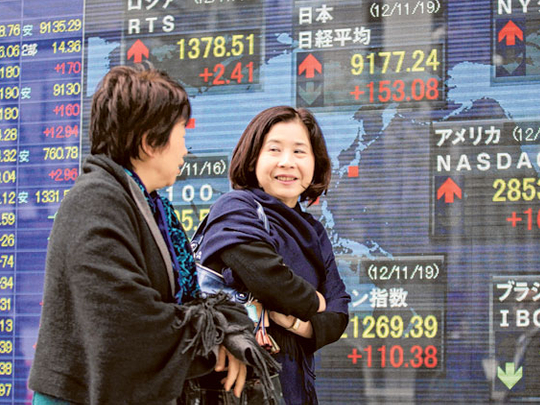
Hong Kong: Asian markets mostly rose Monday on optimism that US lawmakers will be able to agree a deal to avert a “fiscal cliff” that would tip the world’s biggest economy back into recession.
The Nikkei in Tokyo enjoyed a third straight rally due to the yen’s weakness after the front-runner to become Japan’s next prime minister said he would push for unlimited monetary easing if his party won next month’s general election.
Tokyo climbed 1.43 percent, or 129.04 points, to end at 9,153.20, Sydney rose 0.57 per cent, or 24.6 points, to 4,361.4, and Seoul was up 0.93 per cent, or 17.27 points, to close at 1,878.10.
Hong Kong ended up 0.49 per cent, or 103.35 points, at 21.262.36. Shanghai closed up 0.11 per cent, or 2.25 points, at 2,016.98 after dipping below a key support level to a nearly four-year low earlier in the day.
US President Barack Obama — currently on a Southeast Asia visit — has met congressional leaders from both parties to open talks on pulling back from the fiscal cliff of tax hikes and spending cuts, due to take effect on January 1.
Fears around the world over the looming deadline have depressed markets for most of the month.
The two sides stressed willingness to find common ground and avoid a face-off like that over the country’s debt ceiling, which almost brought the country to a standstill in August.
The comments helped Wall Street Friday. The Dow finished up 0.37 per cent and the S&P 500 added 0.48 per cent, although the Nasdaq shed 0.57 per cent.
On currency markets the increased confidence that a deal can be sealed in Washington saw investors move away from the safe-haven yen, providing support to the under-pressure euro and the dollar.
The euro bought $1.2761 and 103.65 yen in early trade, up from $1.2741 and 103.60 yen in New York late Friday. The dollar was slightly down at 81.24 yen from 81.31 yen, after it hit 81.59 yen in earlier trade, its highest level in nearly seven months.
The dollar climbed 2.3 per cent against the yen last week, its best week since February.
The yen was also under selling pressure after opposition party chief Shinzo Abe said last week that he would press the Japanese central bank to carry out a more aggressive monetary policy, which would flood markets with the local currency.
Abe is the leader of the opposition Liberal Democratic Party, which is expected to win the election on December 16.
The Nikkei rose 1.90 per cent on Thursday and another 2.20 per cent on Friday on expectations of a win for Abe, who is a former prime minister.
“After Friday’s rise, there is renewed energy in the market,” said Hiroichi Nishi, general manager of equities at SMBC Nikko Securities.
“With the weaker yen and stronger US stocks, the market is looking more bullish,” he told Dow Jones Newswires.
Oil prices rose. New York’s main contract, light sweet crude for delivery in January, added 82 cents to $87.74 a barrel in the afternoon. Brent North Sea crude for January delivery gained 69 cents to $109.64.











